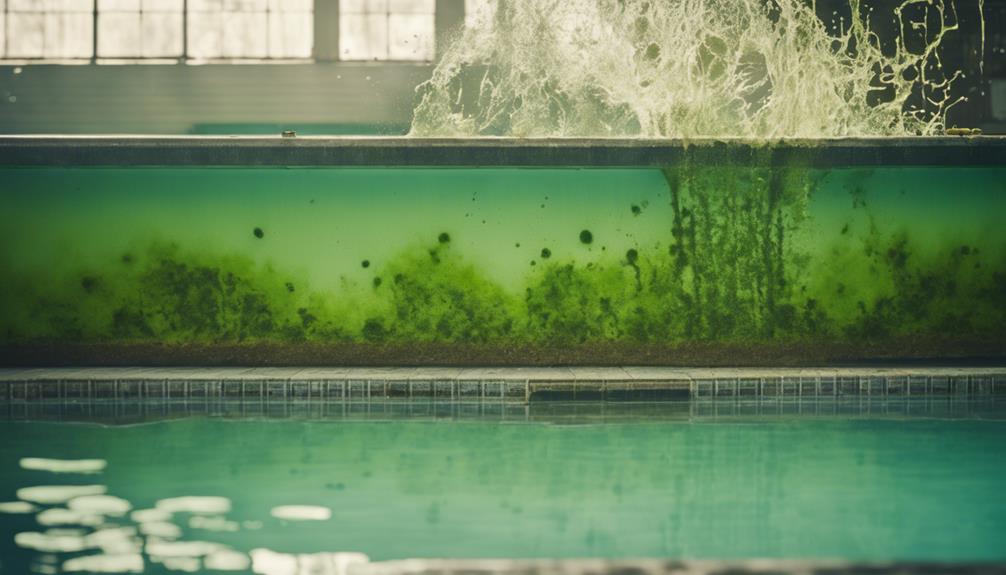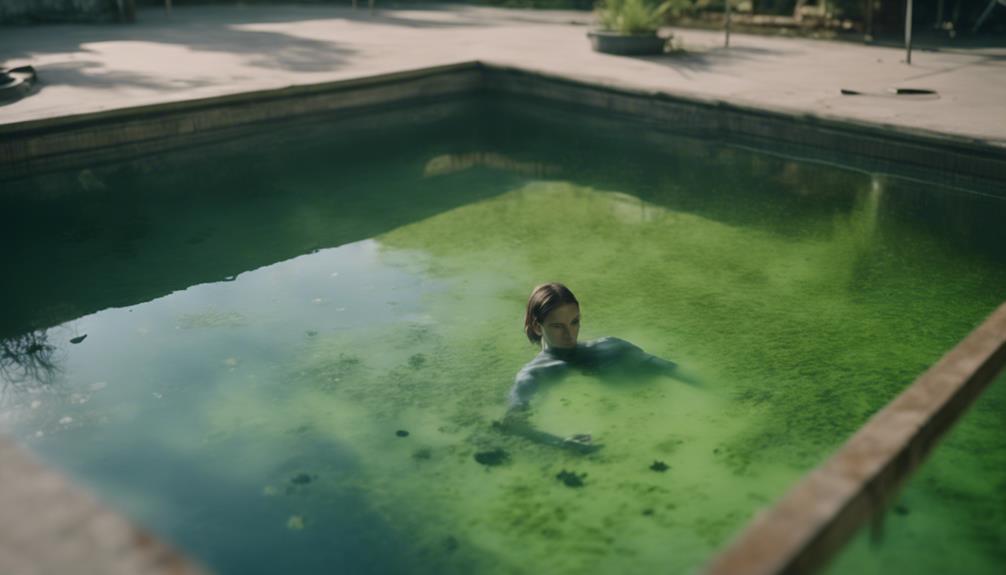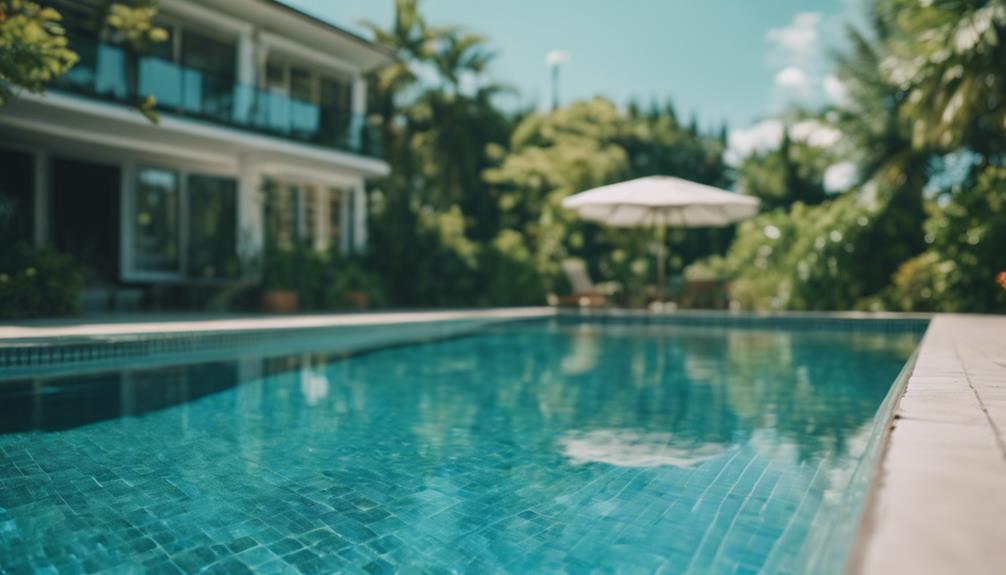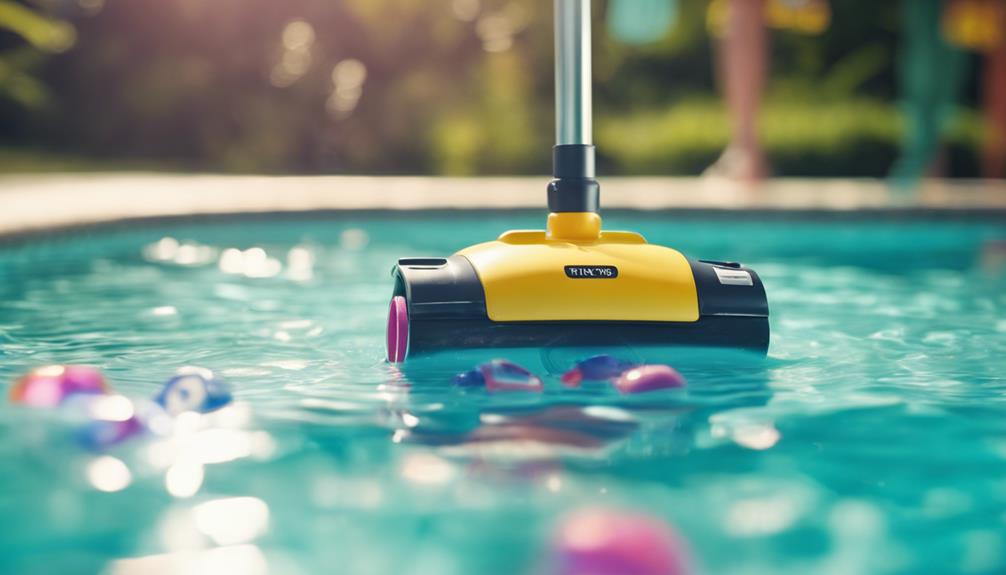So, regarding swimming pool algae – it’s not just a slimy nuisance; it can be pretty risky too! Algae in pools can cause skin irritations, infections, and breathing issues. Plus, it can mess up your pool’s filters and surfaces. Ever heard of algae-related infections? Not fun! Keep an eye out for any signs of algae growth before taking a dip. A little prevention goes a long way in keeping you safe and your pool sparkling. Lots more cool info awaits!
Key Takeaways
- Algae in pools can cause skin irritations, respiratory issues, and infections.
- Swimmers risk exposure to harmful bacteria like E. coli from algae.
- Algae infestations lead to itchy rashes, breathing difficulties, and health concerns.
- Swimming in algae-infested pools poses significant health risks.
- Large quantities of algae make pool water unsafe for swimming.
Health Risks of Pool Algae
Swimming in a pool contaminated with algae can pose serious health risks to you, including skin irritations and respiratory problems. When algae take over a swimming pool, it's not just an aesthetic issue; it's a health concern too. Those slimy green patches aren't just gross—they can harbor harmful bacteria like E. coli, which can lead to infections and illnesses if you come into contact with them.
Imagine diving into the water, only to emerge with itchy skin rashes or struggling to catch your breath due to respiratory issues—all because of algae contamination. That's why swimming in an algae-infested pool isn't safe for you. The large quantities of algae present in such pools pose significant health risks, making the water unsafe for swimmers.
Impact on Pool Equipment

Excessive algae in a pool can cause clogging in filters and plumbing systems, reducing their efficiency. When algae build up, they not only make your pool look like a science experiment gone wrong but can also stain and damage your pool surfaces and equipment if you ignore them.
Black algae are like the super villains of the algae world; they can infiltrate surfaces deeply, making it a nightmare to get rid of them. If you let algae bloom unchecked, they can become resistant to the usual treatment methods, which is bad news for your pool's health.
Picture this: thick algae infestations can lead to serious blockages in your pool systems, messing with your pool's overall functionality. So, it's not just about a green pool anymore; it's about protecting your pool equipment from the algae invasion!
Algae-Related Infections in Swimmers

Algae in pool water can pose serious health risks for swimmers, leading to infections caused by harmful bacteria like e. Coli. When you take a dip in a pool with algae, you're not just swimming in green slime; you're diving into a potential hotbed of bacteria waiting to wreak havoc on your body.
These algae can cause skin rashes, respiratory issues, ear or eye infections, fever, and even diarrhea – definitely not the kind of souvenirs you want to bring back from your swim.
So, what can you do? Regular pool maintenance is key. Keep those algae in check by maintaining proper chlorine levels and cleaning your pool filters regularly. Remember, different types of swimming pools require different upkeep, so make sure you know what's best for yours.
And if you notice algae creeping in, don't wait! Act fast to prevent algae-related infections and keep your swimming experience safe and enjoyable.
Risks of Swimming in Algae-Infested Water

When encountered in pool water, the presence of algae poses significant risks to swimmers' health and safety, potentially leading to various infections and illnesses. So, before diving in, it's essential to be aware of the dangers lurking in algae-infested waters.
Here are some key points to keep in mind:
- Swimming in pool water with algae can result in unpleasant skin rashes, irritating ear or eye infections, or even more severe issues like fever and diarrhea.
- If you accidentally swallow water contaminated with algae, it could lead to health concerns and nasty bacterial infections, making your swim session a lot less fun.
- Contaminated pool water containing algae isn't just gross; it can actually be risky for your well-being, so always check for signs of excessive algae growth before taking a dip.
Types of Pool Algae

Various types of algae commonly found in swimming pools can pose different challenges and require specific treatment approaches for effective removal.
First up, we've green algae, which can turn your pool water slimy and green, signaling that your pool chemicals might need a little love.
Then there's Mustard algae, a tough cookie that doesn't mind chlorine and loves sticking to pool surfaces like it's playing a game of hide-and-seek.
Next, we've got Red algae, which is actually a sneaky bacteria that can quickly take over if you don't show it who's boss.
Last but not least, we can't forget about black algae, those tiny black spots that seem harmless but can spread like wildfire and wreck your pool surfaces.
Each type of algae needs a specific game plan for kicking them out of your pool, so knowing which one you're dealing with is key to winning the algae battle.
Prevention and Treatment Methods

When it comes to keeping your pool algae-free, staying on top of prevention and treatment is essential. Algae in pools can lead to nasty stuff like skin rashes and respiratory problems, so it's vital to tackle it head-on.
From regular testing and chemical shocks to scrubbing and using specialized products, there are effective ways to keep your pool sparkling clean and safe for a rejuvenating swim!
Algae Health Risks
Addressing algae health risks in swimming pools requires careful attention and effective treatment methods to safeguard swimmers from potential infections and illnesses. When it comes to algae in a swimming pool, you need to be mindful of the health risks it poses.
Here are some important points to keep in mind:
- Algae can be hazardous: Swimming in algae-infested water can lead to skin rashes, ear or eye infections, fever, and diarrhea due to harmful bacteria.
- Health risks: Algae in pool water create a breeding ground for harmful bacteria, increasing the chances of swimmers getting sick.
- Contaminated pool water: If ingested, algae in contaminated pool water can cause various health concerns and infections from algae-related bacteria.
To keep your pool safe and enjoyable, it's crucial to address algae promptly. By understanding the risks involved, you can take the necessary steps to prevent any health issues associated with algae in swimming pools.
Effective Treatment Options
Regular testing and treatment schedules play an essential role in preventing and controlling swimming pool algae. To keep algae in your swimming pool at bay, consider using chemical treatments like chlorine or chemical shocks. These can effectively combat algae growth and keep your pool water crystal clear.
Remember, manual scrubbing of algae from pool walls and floors is also a great way to tackle the issue head-on. By promptly treating any signs of algae, you can prevent further damage to your pool surfaces and equipment.
For a more natural approach, you might want to try Pool Marvel Water Treatment. It's a great option for those looking to control algae in their pools without harsh chemicals.
Importance of Timely Algae Removal

Prompt removal of algae is essential to safeguard the health of swimmers and maintain the cleanliness of pool water. If you spot that water turning a murky green, it's a sign that algae might be making itself at home in your pool.
Here's why you need to act fast:
- Health Risks: Algae can harbor harmful bacteria that can cause skin rashes, ear infections, fever, and even diarrhea if left unchecked.
- Filtration Issues: Those pesky algae can clog up your pool's filtration system, making it less effective at keeping the water clean.
- Swimmer Safety: Swimming in water contaminated with algae is like playing a risky game with your health. Don't let those tiny green invaders ruin your pool day!
Algae Control Measures

To effectively manage algae growth in your swimming pool, consider implementing a combination of regular testing, chemical treatments, and physical scrubbing of pool surfaces.
Regularly testing your pool water helps you maintain the best water quality and catch any algae growth early on.
Chemical shocks and chlorine treatments are effective ways to combat algae, preventing them from spreading and maintaining a clean pool.
Additionally, physically scrubbing the walls and floors of your pool helps remove algae and prevent bacteria that feed on them from thriving.
Failure to address algae promptly can lead to algae becoming resistant to treatments, making it harder to eliminate them.
By staying proactive and treating algae promptly, you keep your pool algae-free and your water remains safe for swimming. Products like Pool Marvel Water Treatment can also aid in thorough algae control, enhancing the effectiveness of your algae control measures.
Algae-Free Pool Maintenance

Hey there, pool owner! Ready to keep your pool crystal clear and algae-free?
By staying on top of regular maintenance tasks like scrubbing pool walls, checking chlorine levels, and ensuring your filtration system is doing its job, you'll be one step ahead in the algae battle.
Algae Prevention Methods
Maintaining proper chemical levels in your pool through regular testing is essential for preventing algae growth. To keep your swimming oasis sparkling clean and algae-free, consider the following tips:
- Use Chlorine or Chemical Shocks: These can help control and eliminate algae, keeping your pool water crystal clear.
- Scrub Surfaces Regularly: Promptly scrubbing off any algae you see on pool surfaces can prevent further spread and potential damage.
- Try Pool Marvel Water Treatment: Products like Pool Marvel Water Treatment are effective in controlling and preventing algae outbreaks, ensuring a safe and enjoyable swimming experience for you and your family.
Regular Pool Cleaning
Regularly scrubbing off any algae you see on pool surfaces is key to maintaining an algae-free pool environment. Algae can cause some nasty stuff, so proper maintenance is essential. Think of it like giving your pool a little spa day!
By keeping up with regular pool cleaning, you're not only preventing algae growth but also ensuring that your water stays clean and safe for swimming. It's like giving your pool a high-five for being awesome!
When you stay on top of cleaning routines, you're not just keeping the algae at bay; you're also improving water clarity and overall pool safety. It's a win-win situation!
Plus, consistent upkeep of pool chemicals and filtration systems will help reduce the risks of algae popping up unexpectedly. So, grab that scrub brush and show that algae who's boss! Your pool will thank you, and your swim time will be even more enjoyable without any unwanted green guests.
Water Circulation Importance
Proper water circulation within your swimming pool is paramount for effectively preventing algae growth and maintaining a clean, safe environment for swimmers. When it comes to keeping your pool algae-free, ensuring that the water is circulating correctly is key.
Here are some essential points to keep in mind:
- Even Chemical Distribution: Efficient water circulation helps distribute chemicals evenly throughout the pool, making it harder for algae to take hold.
- Preventing Stagnant Areas: Inadequate water circulation can create stagnant areas where algae thrive, so keeping the water moving is vital.
- Reducing Health Risks: Algae tend to accumulate in poorly circulated areas, increasing the health risks for swimmers. Proper water circulation helps minimize this danger.
Frequently Asked Questions
Is It Okay to Swim in a Pool With Algae?
Swimming in a pool with algae isn't the most essential idea. Algae can bring some not-so-fun health risks like skin rashes, eye or ear infections, and tummy troubles. Plus, all that algae can make a cozy home for some yucky bacteria.
It's important to tackle algae in your pool promptly to keep things clean and safe for a dip. So, best to skip the algae and swim in algae-free waters!
Is Green Pool Algae Toxic?
So, let's talk about green pool algae. It's not the best swimming buddy, you know?
Green algae itself isn't exactly toxic, but here's the catch—it can play host to some nasty bacteria like e. Coli.
And guess what? Diving into water infested with this green stuff can lead to infections, skin rashes, and even breathing troubles.
Is Black Algae in Pools Dangerous to Humans?
Black algae in pools can be a significant health hazard for humans. It's not just about the gross factor; this stuff can actually make you sick. Swimming in water with black algae can lead to infections like e. Coli, skin rashes, and even respiratory issues.
How to Get Rid of Algae in Pool Quickly?
To quickly get rid of algae in your pool, there are several steps you can take.
Start by brushing the pool walls and floor to loosen the algae.
Next, shock the pool with a high dose of chlorine to kill the algae.
Run the filter continuously to help clear the water.
Consider using an algaecide for stubborn algae types.
Regularly test and balance the pool water to prevent algae growth in the future.
How Can I Tell If Algae in My Swimming Pool Is Dangerous?
To determine if the algae in your swimming pool is dangerous, look for green, black, or yellow growth, slimy surfaces, and bad odor. These signs indicate the presence of harmful bacteria and pathogens, making it one of the most dangerous swimming pools. Regular testing and proper maintenance can prevent this.
Conclusion
So, next time you see some green stuff lurking in your pool, don't ignore it!
Remember, 'a stitch in time saves nine' – dealing with pool algae early can prevent a whole lot of trouble down the line.
Keep your pool clean, stay safe, and enjoy splashing around without any worries.
Happy swimming!










